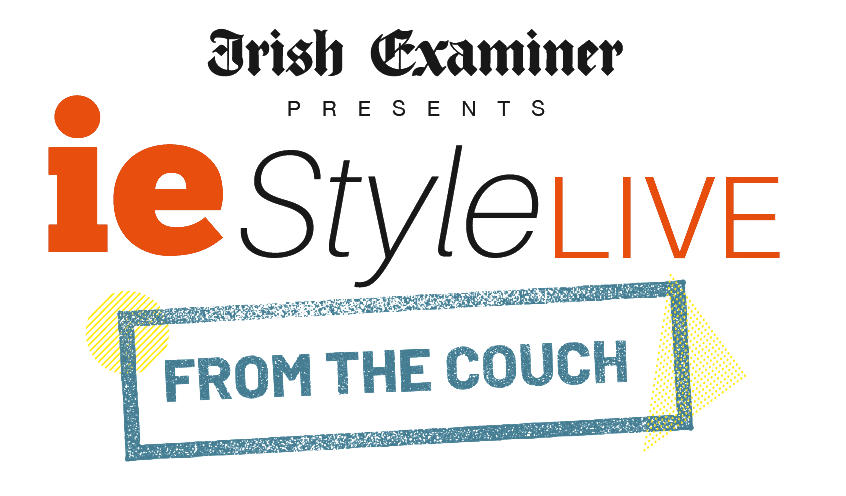WHAT WOMEN
REALLY WANT
WHAT WOMEN REALLY WANT
Samantha Barry, the Cork-born Editor in Chief of Glamour was the guest speaker at our ieStyle Live event. She tells Vickie Maye how she transformed the title into a digital magazine that gives women exactly what they want, from fashion to celebrity, politics to current affairs
Samantha Barry, the Cork-born Editor in Chief of Glamour magazine was the guest speaker at our ieStyle Live event, joining us live from New York. She tells Vickie Maye how she transformed the glossy into a digital magazine that gives women exactly what they want to read - from fashion to celebrity, politics to current affairs
WHAT WOMEN
REALLY WANT
WHAT WOMEN REALLY WANT
Samantha Barry, the Cork-born Editor in Chief of Glamour was the guest speaker at our ieStyle Live event. She tells Vickie Maye how she transformed the title into a digital magazine that gives women exactly what they want, from fashion to celebrity, politics to current affairs
Samantha Barry, the Cork-born Editor in Chief of Glamour magazine was the guest speaker at our ieStyle Live event, joining us live from New York. She tells Vickie Maye how she transformed the glossy into a digital magazine that gives women exactly what they want to read - from fashion to celebrity, politics to current affairs

I’m passionate about finance, fertility, size, inclusiveness. It’s how you tell those bigger stories
When you call the Editor in Chief of Glamour magazine, you expect a PA, maybe even two, to pick up the call and transfer you. But this is no ordinary Editor in Chief. This is Samantha Barry. She might hang out with Anna Wintour at Condé Nast, but she’s never lost her Ballincollig roots.
It’s not just the fact she hands out her direct line. It’s also her attitude to the concept of celebrity — she is utterly unfazed by fame. “Maybe it’s a Cork thing,” she says, laughing. “They are people. I mean, they are brilliant people and I want to learn from them. I’m excited to sit beside Charlize Theron (at the Glamour Women of the Year awards) and ask, what are you working on. But I’m not sycophantic about it.” She’s so unaffected by it all, she can’t name one person she’d be in awe meeting. “I would have said Michelle Obama but I got to meet her. I’ve been very lucky, the people I have met through my work,” she says. “Local journalists, like people I met in Burma, that don’t do it for the accolade, they impress me. They are tirelessly working to tell their local stories, they are understated, under the radar. They impress me more than anyone.”
It’s no surprise her heroes are from the world of news. It’s in her blood. It’s where her career began. She spent time in Papua New Guinea with the Australian Broadcasting Corporation working with local radio journalists. Later she joined the BBC, focusing on using social media as a tool for both news gathering and audience building, then CNN as executive producer for social and emerging media, before she made the move to Condé Nast. “I was on the hamster wheel of breaking news, for that moment, that hour, that day.
“That news sense is still there, but it’s through a different lens.” Glamour’s stories on the best masks for different occasions, like which ones to wear while working out, have been read by millions. But Barry ties that in with big editorial content. The recent ‘Hair Issue’ was a month of stories that ‘celebrated the joy, untangled the myths, and fought the policing of Black women’s hair’. “It was a passion project — looking at the history and the discrimination,” Barry explains. “I’m passionate about finance, fertility, size, inclusiveness. It’s how you tell those bigger stories.” The longer we talk, the more I get “it”, this Glamour “mix” that attracts readers in their millions.
We discuss women and finance (more on that later), empowerment, diversity. Yet there are also chats about the recent demolition of The Sextant pub in Cork, how much she’d love a toastie in an Irish pub again. It’s a broad sweep, a taste of real life issues, the serious and the mundane, that’s echoed too in the day’s edition of Glamour international. The top story is a cult polka dot dress, then face mask recommendations, the Kardashians —plus a story on how to help a friend with suicidal thoughts. There’s celebrity news, but alongside it there’s political coverage. All of the stories, light and heavy, are issues women talk about, care about.

Women have been left out of the conversation. It should be taught in schools. These conversations need to start at home, around the dinner table
“Glamour — and Samantha Barry — know what we want. And its digital-only platform, one of Barry’s earliest calls as Editor in Chief, has proven a huge success in this stay-at-home era of Covid. Traffic to the site, she says, has soared since lockdown.
We chat a couple of weeks before our ieStyle Live event. Barry is our guest speaker at our virtual evening, in conversation with our host Sonya Lennon. (Last year’sinaugural event at Cork City Hall was a sell out — Covid-19 meant 2020 was hosted online.)
Bringing our magazine to life, the focus is that Glamour-esque mix of fashion, beauty, plus all the bigger issues women want to talk about. But there’s one area we don’t discuss enough says Barry — money. Women and finance has been a focal point for her in 2020, from editorial specials to podcasts.
“I’ve lived pay cheque to pay cheque and I’ve been in my overdraft more times than I care to remember in my 20s. I’m in a better place now but in some of those moments it was because I put my head in the sand. “Women have been left out of the conversation. It should be taught in schools. “These conversations need to start at home, around the dinner table. “My niece is eight in Killarney. I tell her there are three things she can do with money I give her for her communion or for Christmas. “She can spend some, save some or give some. So she can spend €2 on sweets, save to get that LOL dollhouse and give some to a puppy charity she loves.”
And it goes beyond how we handle our money, it’s also how we demand it. “The guys always ask for more,” she adds “Advocate for yourself — we earn less yet when we invest money women are more profitable than men.” It’s all connected to a lack of confidence, we both agree. So what can we do to make sure girls, like her eight-year-old niece, know they can achieve anything, to be ‘fearless’ (like the name of the recent RTÉ documentary that followed her preparations for the Glamour Women of the Year Awards in 2019).
“Recently at work it was very long day and I said ‘you all did a great job, what did you do?’ And they looked back at me blankly. “I had to explain, my mother was very good at reinforcing words of validation back to us. She’d say, ‘you were very kind today, what are you?’” She’s aware too this doesn’t come easy to the Irish; self-deprecation is our default mode. “Heaven forbid we be judged as having notions,” laughs Barry. “But it’s changing a little bit now. We don’t need to knock people down — we don’t want notions but it’s ok to have appreciation of what you’ve done. I love the self-deprecation of the Irish from a place of humour, but not from a place of pulling someone down. “This is a time to lift each other up.”
It’s an ethos she brings to her office too, where she manages a team of 45, 20 of them her core crew - the Glamour ‘family’. “I had an amazing boss at CNN, I don’t think I could be the leader I am today without her. I hope I will pass that on to people too. I would tell her about someone in a meeting and she’d say, ‘That person just wants to be heard’. She told me to frame reviews in three ways: ‘Keep doing this, stop this, and start this, as this is where you’ll start elevating.’” Key to her leadership model is a willingness to be open to constructive feedback: “I ask, ‘What do I need to do to get better?’ You know, no one is ever perfect.” She makes sure too her staff are heard. “I have office hour where I check in couple of times a month, but not about a project. It’s everything on the periphery — ‘what is happening in your life, do you need help?’ It’s brilliant, organic. You make yourself available to them, and I know them a bit better.”
"Heaven forbid we be judged as having notions. But it's changing a little bit now. We don’t need to knock people down - we don’t want notions but it’s ok to have appreciation of what you’ve done."
She’s dressing well, she says - from the waist up at least
Samantha is still working from home (she’s dressing well, she says — from the waist up at least, with back-to-back Zoom calls). There are no plans to go back to the office until early 2021, but she misses the structure, the routine. She is, she admits, itching to get back home to Ireland. But she takes solace in the fact she got home last Christmas, treating her family to a stay at Hayfield Manor.
“It was real quality time,” she says, with one of her highlights a visit to her favourite pub in Cork. No, it’s not a super trendy cocktail bar, instead it’s Cork’s cosiest, most down to earth pub: The Mutton Lane Inn. And when you hear that’s her favourite drinking venue, suddenly the missing secretary makes so much sense.



